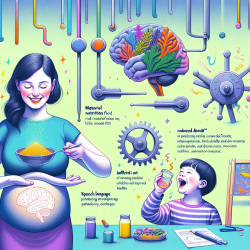Understanding the Impact of Maternal Iodine on Child Development
In the realm of child development, the role of maternal nutrition during pregnancy is a critical area of study. A recent research article titled "Maternal Iodine Status During Pregnancy Is Not Consistently Associated with Attention-Deficit Hyperactivity Disorder or Autistic Traits in Children" sheds light on this topic. This study, published in The Journal of Nutrition, explores the relationship between maternal iodine levels during pregnancy and the development of ADHD and autistic traits in children.
Key Findings from the Study
The study examined data from three large birth cohorts: Generation R, INfancia y Medio Ambiente (INMA), and the Avon Longitudinal Study of Parents and Children (ALSPAC). It investigated whether low maternal iodine levels, indicated by urinary iodine-to-creatinine ratios (UI/Creat) below 150 µg/g, were associated with increased risks of ADHD or autistic traits in children.
Surprisingly, the study found no consistent evidence linking mild-to-moderate iodine deficiency during pregnancy with ADHD or autistic traits. Specifically, the pooled analysis across the cohorts showed no significant association between low maternal iodine levels and these neurodevelopmental outcomes.
Implications for Practitioners
For practitioners in the field of speech-language pathology and child development, these findings offer valuable insights. Here are a few takeaways:
- Focus on Comprehensive Nutritional Assessment: While iodine is essential, this study suggests that mild-to-moderate deficiencies may not directly correlate with ADHD or autistic traits. Practitioners should consider a holistic approach to maternal nutrition, encompassing a range of nutrients critical for fetal development.
- Encourage Further Research: This study highlights the complexity of nutritional influences on child development. Encouraging further research into other potential nutritional and environmental factors can help refine our understanding and improve intervention strategies.
- Data-Driven Interventions: Emphasize the importance of data-driven decisions in clinical practice. Utilize comprehensive assessments and evidence-based interventions to support optimal developmental outcomes for children.
Moving Forward
While this study provides important insights, it also underscores the need for continued research into the multifaceted influences on child development. Practitioners are encouraged to stay informed about emerging research and integrate these findings into their practice to support children and families effectively.
To read the original research paper, please follow this link: Maternal Iodine Status During Pregnancy Is Not Consistently Associated with Attention-Deficit Hyperactivity Disorder or Autistic Traits in Children.










